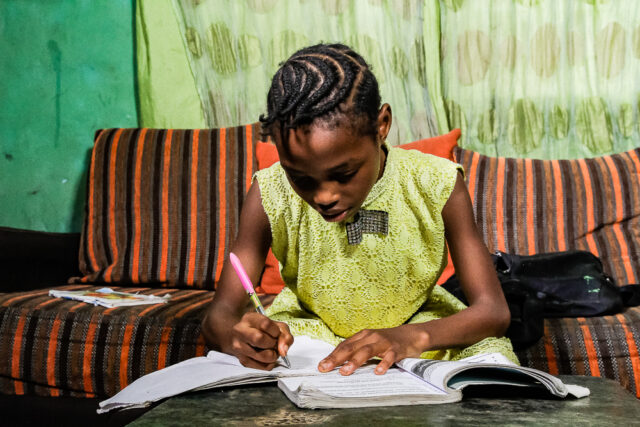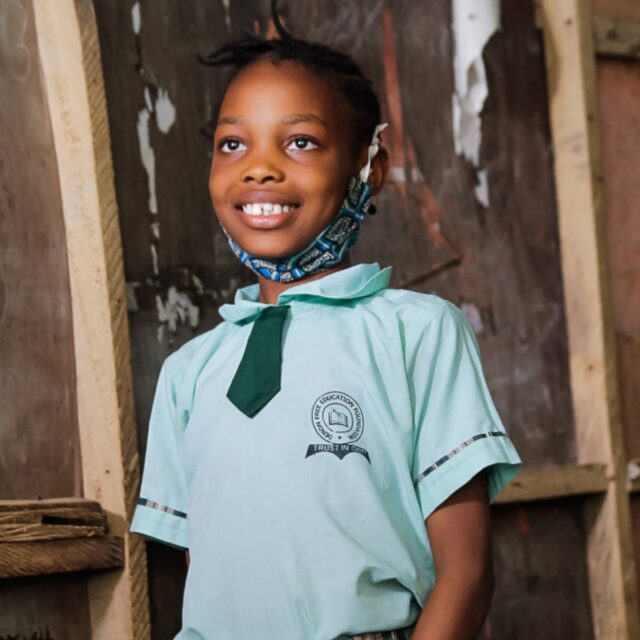Ten-year-old Esther Okore, a primary six student of the Denon Free Tuition Education Foundation at Agbelekale, on the outskirts of Lagos, Nigeria, is a brilliant child who dreams of becoming a medical doctor. However, during the COVID-19 lockdown, her father lost his job, thus threatening not only whether or not Esther could stay in school, but also her four other siblings.
Esther dreams of becoming a doctor as a means of giving back to society, but today that is a very tall dream, as she reveals, “I enjoy going to school because I want to be a doctor in order to help sick people and without going to school, I can’t be a doctor.”
Online learning wasn’t an option
Esther has already started feeling the impact of the financial implications on the loss on her education as she could not join her classmates to study remotely during the pandemic. “During the COVID-19 lockdown, my mother and my senior brother helped me with my studies,” she said. The help of her mum and siblings tried to fill in the gap of the remote online classes she couldn’t be part of.
And despite her zeal to learn more, she is faced with challenges that inhibit learning. One can easily conclude that Esther is a go-getter who sees what she wants and goes for it. Besides, Esther is a happy child who loves playing football and interacting with her classmates.
“I want my school to have tiles, air conditioning, a fan and a canteen. I would also love my school to have a library filled with books because I love reading; I want my class painted with a computer room. I want the government to improve the educational system so that children can go to school,” she says.
Switching to at-home learning
On his part, Esther’s father, Desmond Okore feels bad that he couldn’t do so much for his brilliant daughter and more, unfortunately, as he lost his job during the pandemic.
“I lost my job during the lockdown and it was very hard for us,” he says. “The lockdown affected her, but her mum is a teacher so she taught them one or two things to put them through.”
Esther’s mum knew that there was a possibility for the children to get rusty during the pandemic, but she is glad that she was able to help them stay active.
“During [the] COVID-19 lockdown, I helped my children with their studies because I knew that they would forget the things they have been taught. Every day, I take an hour or two out of my time to coach them and this really helped them,” she says.

Overhauling the current education system
Beyond her intelligence, Esther, according to her parents, is a good girl, who likes reading and writing stories, and loves school generally. “I want the Nigerian Government and world leaders to improve the level of education in Nigeria, especially for the underprivileged children because not all parents can afford private schools,” her mom shares.
Master Messiah, Esther’s class teacher, also found her to be a pleasant student with a bright future if she is given the needed assistance. He explains, “Esther has been a very good student, who pays attention in class and always does well.”
According to him, the importance of education, especially for girls,cannot be overemphasized, as it’s pivotal to the nation’s growth. “Education is very important in order to avoid pre-marital sex or unwanted pregnancy and I think the government should create awareness on its value and importance.”
Messiah believes that the educational system in Nigeria needs a total overhaul, as the COVID-19 outbreak has affected the educational system in so many ways.
The founder of the school, Mazi, Gabriel Arinze, said that he started the free school in order to help children like Esther whose parents do not have the capacity to educate them.
He shares that the COVID-19 really did hit him and his students with a heavy blow, as their school didn’t have infrastructure to carry out remote learning. Arinze shares that he is willing to support Esther’s education to a tertiary institution because of the excellent spirits that she has continued to showcase, even throughout the pandemic.
How poverty impacts education, even before COVID-19
According to a 2019 Executive Summary on Poverty and Inequality by the National Bureau of Statistics, 40.1% of the population in Nigeria, Africa’s most populous country, is classified as poor.
Prior to the COVID-19 pandemic, access to a proper education by young children was a struggle, as Nigeria makes up approximately 20% of the global out-of-school population.
According to a report by the United Nations Children’s Fund, one in every five of the world’s out-of-school children is in Nigeria. “Even though primary education is officially free and compulsory, about 10.5 million of the country’s children aged 5-14 years are not in school. Only 61%of 6-11 year-olds regularly attend primary school and only 35.6%of children aged 36-59 months receive early childhood education,” the Fund stated.
If nothing is done now to save the situation, students like Esther might soon be a part of that out-of-school population due to poverty and other inhibitions. But together, we can change that.
How you can help
School closures and the challenges of remote learning due to the pandemic have greatly impacted children’s education globally. Even prior to the pandemic, 90% of 10-year-olds in low-income countries couldn’t read or understand something simple, like a school test or health leaflet.
Now, because of the pandemic, that number is at risk of increasing, with the potential for girls, in particular, to fall through the cracks. That’s why we must act now.
As world leaders meet to come up with a global response to the learning crisis, join us in asking them to invest in quality education for all children, regardless of where they live. Because the children of today, like Esther, are the doctors, leaders, and scientists of tomorrow.



